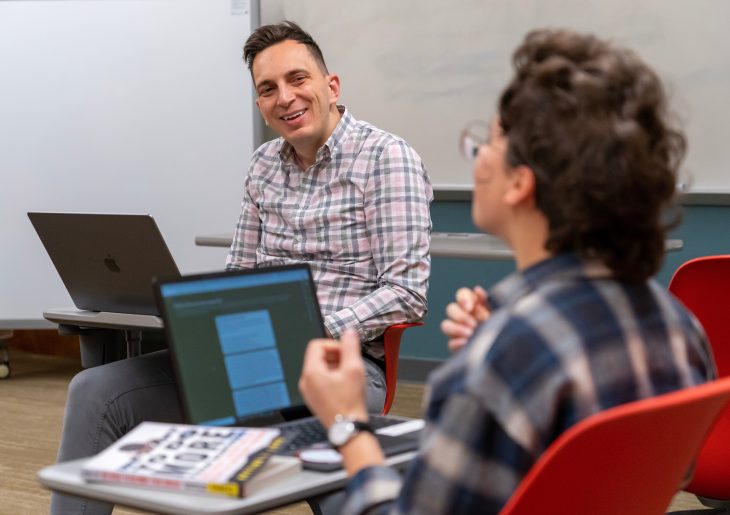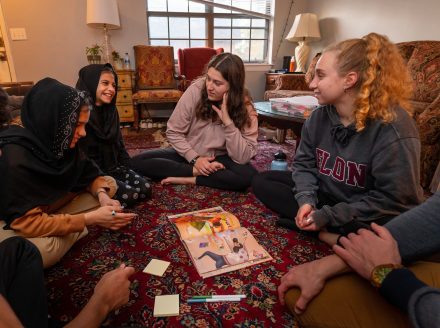Drawing from his own experiences as a refugee, Nermin Vehabovic is redefining how Elon’s teacher candidates teach culturally and linguistically diverse learners.

Born in Bosnia and Herzegovina, the backdrop of Nermin Vehabovic’s early childhood was ethnic cleansing and genocide. The Bosnian war that started in 1992 left Vehabovic and his family refugees. He was 6 when his family moved to Germany to escape the violence.
“It was not possible for us to stay in our hometown of Banja Luka,” says Vehabovic, an assistant professor in the Dr. Jo Watts Williams School of Education. Even when the war ended in 1995, it still wasn’t safe to return. Vehabovic started school in Germany, although he only spoke Bosnian. “I didn’t know any German,” he recalls. “I remember sitting in the classroom and the teacher just yelling at me. They must have thought that I didn’t know anything. I remember the other children tried to help me, but the teacher told them not to do that.”
Six years later when Vehabovic and his family were cleared to move to the United States, specifically North Carolina, he was again the new kid — a sensitive and inquisitive 12-year-old whose life experiences were rich and dynamic, even though he only spoke a few phrases in English. “There was this unspoken narrative,” he says. “A narrative that centered around learning English and forgetting my heritage language and culture, rich life experiences and ways of knowing that had shaped me.”
Forget about your past. Speak English. Move on.
“But that wasn’t authentic to who I am,” he says. “I would go home and speak Bosnian with my family. German was in the back of my mind, too. I would write letters to my friends in Germany. But I felt like nobody truly understood me or empathized with my lived experiences. I had these really rich, powerful experiences that nobody seemed interested in tapping into.”
He learned English and now, while not forgetting the past, embraces everyday opportunities to navigate languages and cross linguistic and cultural boundaries. It informs his teaching and research as an educator, preparing students to teach culturally and linguistically diverse learners. It inspires his innovative teaching approaches and fuels his passion and desire to positively impact the in- and out-of-school experiences of children with immigrant and refugee backgrounds.
***
Using children’s literature to engage in meaningful conversations, which Vehabovic refers to as interactive read-aloud sessions, students in the Adolescent Literacies course get an opportunity to work firsthand with multilingual children who recently moved to the United States. As teacher candidates, many don’t have extensive experience working with immigrant and refugee students. “It’s not necessarily a fear but an ‘oh my gosh, I don’t know if I’m doing the right thing.,” Vehabovic says.
Traditionally, the approach for working with refugee children is rooted in the idea that there is a language deficit and they, their families and their communities are broken in some way. Vehabovic steadfastly works to debunk that narrative with an approach that includes “learning with and from” these children and families.
This past semester, Elon’s teacher candidates enrolled in the Adolescent Literacies course participated in two community engagement experiences. Every week half of Vehabovic’s class worked with graduate students in Elon’s Physician Assistant Studies program in Start Early in Medicine, an afterschool science program for middle and high school students in underserved communities. The PA students brought their knowledge of science and the education students served as teacher consultants. The other half used children’s literature to connect with a refugee family from Afghanistan that recently settled in Burlington.
My students, whom I consider my colleagues, say they’re able to care deeply for the children, and subsequently also tap into and expand upon their own empathy. They learn with and from and see the humanity in these children.
There are seven children in the family, including two middle schoolers and one high schooler. Their heritage languages are Dari and Pashto. The eldest child, a boy, has had access to formal schooling, which provides new opportunities for teaching and thinking about adolescent literacies. “When I’m in my school placement, sometimes I see students who can read and write in Spanish, and we go back and forth from Spanish to written English as one way of supporting their learning,” says Faith Minor ’23, who has participated in the read-aloud sessions. “But that’s not an option in this situation because Pashto is not accessible to them.”
The teacher candidates are challenged to think creatively about adolescent literacies. Once a week for an hour, they gather on the floor in the family’s apartment, reading a picture book together that touches upon the children’s interests. Recently, the book “All Are Welcome” was passed among them, and they all interacted with and responded to the images and text. Specifically, pictures in the book were used as conversation starters. They also created drawings as another form of communicating what they were thinking and feeling.
From there, conversations about their first day at school or the differences between Burlington and their community in Afghanistan ensued. They shared TikTok videos of their hometown, showing their new teachers how the once familiar places have since changed. “It goes beyond reading,” Vehabovic says. “My students, whom I consider my colleagues, say they’re able to care deeply for the children, and subsequently also tap into and expand upon their own empathy. They learn with and from and see the humanity in these children.”
***

The students in Vehabovic’s class are enjoying a teaching experience that isn’t in a typical classroom. “It’s nice to be in a different type of educational setting,” says Julia Strouse ’24. “We are in this family’s living room. We are in their own space.” Experiencing the children’s appreciation firsthand is powerful. “I am surprised by how eager they are to learn and share whatever we’re doing,” says Hannah Fritts ’24. “If I was a middle schooler and these people were coming to read with me at my house, I’d be a little annoyed, but they are so excited every time we are there. We are definitely learning with and from them.”
That, in return, builds trust. One day, one of the children lay down on the floor and confessed, “I can’t read, and I’m in the fifth grade.” Shortly after, the children were all passing around a picture book that repeated the same phrase over and over. “They had heard it many times,” Vehabovic says. “One of them said, ‘oh, I’m reading.’ It’s building confidence. We are tapping into what they already know and we are not being bogged down by a deficit type of thinking.”
Vehabovic also teaches a Children’s Literature course. Those students are working with refugees, but from afar. Students from that class are recording interactive read-alouds for families in Durham. Prior to the pandemic, the read-alouds were happening in person. “It’s a video of a student reading and asking questions to engage children and elicit conversation as if they were there,” he says.
Vehabovic believes that there is value in his teaching approaches, which he draws from his research and scholarship. In an effort to learn with and from current teachers, as well as Elon teacher candidates and alumni, he and Allison Bryan, director of the Curriculum Resources Center and associate librarian in the Watts Williams School of Education, hosted in September the 2022 Elon Education Conference with the support of a $2,250 grant received from the Elon Innovation Council. The conference provided attendees with the chance to dive deeper into how to establish partnerships with multilingual students, families and communities, as well as how to integrate inclusive technologies into their classrooms.
Every student, regardless of their background, benefits from such an approach, Vehabovic says. “A strategy that works effectively with multilingual students can benefit students who are not multilingual students,” he adds. “If you’re in a bilingual or English-dominant classroom, all students benefit when there are strategies around using languages in creative, playful and innovative ways.”
Whether it’s collaborating with PA students to give middle school students a head start to a career in medicine, recording read-alouds, providing tools to educators working with multilingual families or sitting on the floor with children from Afghanistan in their living room, it all comes down to creating equity and foregrounding love. “I draw on Dr. Yolanda Sealey-Ruiz’s notion of ‘critical love,’ which is about caring deeply for the communities and people that we serve,” Vehabovic says. “That’s what I hope the Elon Education teacher candidates will get from this experience — care, love and empathy for the students that they serve.”
Elon Innovation Council at a glance
Launched in spring 2019, the mission of the Elon Innovation Council is to stimulate a culture of curiosity and creativity within the Elon community. It aims to empower students, faculty and staff to discover, develop and deploy groundbreaking and mission-aligned projects that create value for the entire community.
The council annually offers grants for innovative project proposals that support the objectives and themes within Boldly Elon, the university’s 10-year strategic plan. Recent projects included the 2022 Elon Education Conference, which focused on inclusive technology tools and partnerships with multilingual students, families and communities, and Elon Drone Day 2022, which exposed a broader on- and off-campus audience to the technological and professional potential of the growing drone industry.
In all, the council has supported 11 projects centered around objectives such as building interdisciplinary work on campus, enhancing inclusivity and belonging, supporting the internationalization of Elon’s campus, building local partnerships and connections with alumni, and other areas. Visit elon.edu/innovates to learn more about the council.


